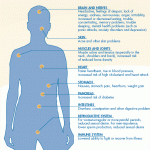Guilt About Too Much Money?
 Friday, August 5, 2011 at 3:32AM
Friday, August 5, 2011 at 3:32AM  1 Comment
1 Comment I know it seems bizarre, but there are people who have a lot of money and feel GUILTY about it. According to Brad & Ted Klontz, Mind Over Money, "financial rejection" is a fairly common money problem. I know what they're talking about. I had a friend who received a large inheritance and within 3 years it was all gone. Why? She didn't feel she deserved it or had earned it. Having money rather than "working" and struggling for it was out of her comfort zone. There were issues with her parents tied up in the guilt she felt, but she didn't know how to access that unfinished business.
about. I had a friend who received a large inheritance and within 3 years it was all gone. Why? She didn't feel she deserved it or had earned it. Having money rather than "working" and struggling for it was out of her comfort zone. There were issues with her parents tied up in the guilt she felt, but she didn't know how to access that unfinished business.
If we have money issues (& like with food, who doesn't?) and we don't explore how and what we believe about money and our self and where those beliefs came from, we'll keep playing the same cards wondering why we can't seem to win at this money game called life.
Another story to illustrate financial rejection: Kathy Trant's husband, Dan, was a stockbroker killed in the 9/11 attack. Kathy received almost 5 million dollars in settlements and donations. By 2005 she had only $500,000 left. Kathy spent money in a frenzy she didn't understand - it was "blood" money she didn't want. (Klontz)
Other ways the rejection of money shows up include taking a vow of poverty or being creative or spiritual and having a love/hate relationship with money. This money struggle is one that "Creator-Artist" archetypes often express. (Deborah Price, Money Magic). I have a sister who is an exquisite artist but lives  on disability and barely gets by. Vows of poverty are often common among those in the helping professions also and I unconsciously played this one out for years. Not anymore though.
on disability and barely gets by. Vows of poverty are often common among those in the helping professions also and I unconsciously played this one out for years. Not anymore though.
All of these money issues are rooted in unexamined beliefs, attitudes and convictions brought forward from childhood and cemented into our adulthood through experience and repetition. The good news is that the thinking brain can create new neural connections with insight and new, repeated behaviors. Check out the "Unfinished Business" blog for some how-to's.




















 Money Magic Teleseminar:
Money Magic Teleseminar:





